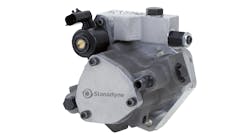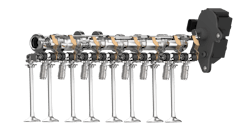There could be major technological changes coming to the automotive industry at large and the aftermarket in particular, according to analysts at Capgemini. The management consulting company released its predictions for 2016, and it appears they anticipate major changes in the way OEMs manufacture vehicles, as well as how consumers purchase, insure and service their vehicles.
For the aftermarket, Capgemini's global automotive lead, Nick Gill, says that Amazon or a similar type of tech company could be a major disruptor. Leveraging real-time data analytics and connected car technology on traditional providers like Amazon could help guide parts purchasing, as well as facilitate online scheduling and the purchase of maintenance and repair services.
"Companies like Amazon or new sites that operate like Priceline for auto repair will gain steam and momentum, because they can provide painless, on-demand service," Gill says. "In this case, convenience is more important than having the lowest price possible. We'll see more aggressive and tailored packages for the customer, and more fighting for the service dollar."
According to Gill, there already are some small online startups in Europe that use the Priceline model to sell and schedule vehicle service. Customers input their vehicle make/model and service need, and the website shops for the best price for the work.
"Those types of sites are not huge yet, but they definitely co-exist along side traditional service channels in Europe," Gill says. "When it comes to the U.S. market, it will be interesting to observe how they fair."
3D printed cars
| FREE TELEMATICS WHITEPAPER by Commitment to Training | |
Stay ahead of the industry by expanding your technical automotive knowledge by downloading our free whitepaper. |
|
Capgemini also expects that the industry will see the first design prototype of a car that has more than 50 percent of its parts 3D printed. Local Motors has already 3D-printed several concept cars, and Gill thinks the technology will also provide a way to create on-demand replacement parts.
"Additive manufacturing has been used for many years for prototyping, and many companies are interested in creating certain types of parts that are made mostly of plastics," Gill says. "In the future, this could circumvent the issue of supply and demand, and would be a great solution for certain cases where a part is needed urgently, but it's not on hand."
3D printing could provide rapid solutions for difficult repair problems by allowing companies to print missing parts, or even design and create custom solutions on an ad hoc basis.
Goodbye to traditional car ownership?
Another trend that could potentially affect the way consumers service their vehicles is a shift in the ownership model. In urban markets, there has already been a push for more vehicle sharing through services like Lyft and Uber, and on-demand vehicle rental via companies like Car2Go. Capgemini believes an auto dealer will offer to sell a car on a "driving and data" plan, discounting the base model with the purchase of a contract for driving a set number of miles and using a set amount of data per month.
"There are already experimental car ownership models," Gill says. "For example, there are models where if you live in a high-rise in New York, the building will offer a fleet of vehicles and you pay fractionally for their usage. You don't own them, but you can take them wherever you wish."
Gill expects a large dealer group to start similarly experimenting with the ownership model. "One of the larger mega dealers will likely introduce in the market a non-traditional way of owning the vehicle, where you get insurance and ownership," Gill says. "It might open up opportunities for advertising revenue, but might provide a way for owners to get out of that vehicle and into a new one faster."
That could alter the way drivers service vehicles since they might not keep them past the warranty period. Fleet-based business in some markets would overtake individual vehicle opportunities, meaning both dealerships and aftermarket service providers would be competing for contract business with the fleet owners.
More personalized insurance
Insurance providers already use telematics for usage based insurance (UBI) applications. Gill expects insurance carriers to take this even father by using real-time analytics to offer highly personalized insurance packages. Drivers could, for example, get a cheaper premium if they drive in safer neighborhoods.
"We'll see predictive modeling based on much more data," Gill says. "Contracts will be based on big data analysis, some of which you would consent to provide through a risk profile. That could provide lower costs or higher value packages from insurance companies, justified by the insights and data they gain from the vehicles."
That data could include information on where the driver is operating the vehicle, traffic patterns, and other information outside of traditional insurance data gathering.
That data gathering will also be critical for autonomous vehicle applications.
"Analytics will be very important in terms of showing where a vehicle was going and who was at fault if there is an accident," Gill says. "As more autonomous vehicles enter the market, insurance companies will need products to meet demand for that technology."
Subscribe to Aftermarket Business World and receive articles like this every month….absolutely free. Click here.



